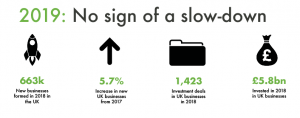Five Tips for Raising Finance in Brexitland
With the political and economic uncertainty that goes hand in hand with Brexit, our instincts might tell us that now is not the right time to raise funds. However, all of the available evidence is telling us the opposite. While the news may be positive, it still comes with some caveats; we spoke to industry specialists and a number of our angel investors to get their advice on how entrepreneurs should approach fundraising in times of economic ambiguity – so, for those valiant start-ups or scaleups who will seek funding in 2019, our top five tips are below:
1 Make sure your valuation is rock solid
Downturns affect the public stock markets first. And where the public goes, the private follows. Therefore, it is crucial to have a realistic – conservative even – valuation. Modwenna Rees-Mogg, Editor of The Angel News, explains. ‘We are long overdue a recession. Businesses looking for money have to be reasonable about their valuation. Investors are looking for a company that has cash flow and an interesting structure – borrowing money that converts into shares protects the downside from a lower valuation. Scaleups who have money in the bank are those that will survive a downturn’. Todd Hicks, writing for Forbes, continues. ‘Companies decide what expectations to signal, and signalling has a significant effect on how new investors structure offers. I have seen investors walk away because the signalled expectations were too far from the price and terms they were prepared to offer. On the other hand, a company that signals confidence and an expectation that is slightly aggressive – but basically realistic – can lead a new investor to make a better first offer. It’s vital to get at least one offer and very important to get more than one. This is the strongest reason to keep expectations reasonable at the start’.
Ultimately, the message is: don’t pick a valuation out of thin air, get advice from an expert – such as a professional investment analyst – and listen. They know what they’re talking about.
2 Get your own fundraising platform
When the future isn’t certain and people are less willing to dig deep, a traditional campaign – typically 30 – 60 days in length – is less likely to get you to your funding minimum. However, opting for a customised, digital platform will give you as much time as you need – it could be six months, it could be a year – and the best chance of a successful fundraise. The benefits are myriad: with a dedicated site, there is no chance of losing your hard-won investors to another deal and you will also be able to keep a record of your investor data and activity. Full FCA regulatory compliance will save time – and money – on the legals and an investor relations portal will enable you to keep your investors in the loop and – crucially – warm for the next round (see point 4 below). You’ll be able to customise your site in any way you like and digital pledging tools will allow your potential shareholders to invest in your business, at any time of the day or night.
3 Have a strong international strategy
International is key and should be looked at strategically from two perspectives: How can international expansion benefit my business and how will attracting international investment help my business to scale?
Having a presence in multiple markets allows you to spread risk; should sales slump domestically, sales in foreign markets – unaffected by Brexit – can bolster revenues. Keep in mind that international expansion is a long-term project and often requires significant capital, so those businesses who currently have no international operations, may want to look to form strategic partnerships in the first instance.
Investment from abroad is the second point to consider when looking at internationalisation. With more caution potentially coming from local investors, international represents a large and important opportunity. China is the perfect, Brexit-proof example. Mark Hedley, Director of the China-Britain Business Council, says ‘You simply cannot afford not to look at China. There is a huge consumer demand for innovative UK tech and this has created a vibrant opportunity.’ Chinese provincial governments even have a mandate to attract high end technology companies for mutual gain; this has led to the creation of funds and incentives, such as dedicated tech parks, subsidised rent schemes and incubation/acceleration programmes.
4 Keep your investors warm and happy
Happy investors make repeat investors. Despite this, many companies revert to business as usual after a raise and tend to forget about shareholders once the money is in the bank. It is crucial that businesses communicate honestly and regularly with their investors. Whether it’s through an investor relations portal on a digital platform or having a dedicated staff member to keep them happy, it’s a vital factor in any start-up’s road to success.
Be sure to provide your shareholders with regular updates on business performance, good or bad: they can celebrate the good and guide you through any trouble spots. By keeping your current shareholders happy, you are potentially saving yourself a lot of hard work when it’s again time to raise funds.
5 Invest in marketing
Invest in marketing – your funding is going to come from multiple sources, so you need to work hard to appeal to each and every one of them and it’s worth validating your proposition – via market research – before you get started. This doesn’t have to cost an arm and a leg – if you’ve fundraised before, start with your existing investors. Alternatively, you can run smaller panels and extrapolate the results. A good fundraising marketing campaign starts with the strategy: you’ll want to include a social plan, PR and targeted marketing at a minimum. All of this is time-consuming, so for those with limited internal resources, there are several strong marketing agencies that specialise in fundraising and who can lend a pair of experienced hands.

